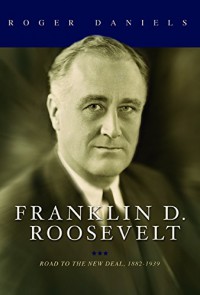A fresh look at America's 32nd president

I must confess considerable exasperation with our seemingly inexhaustible appetite for biographies for certain subjects. This is for a variety of reasons; it reinforces the idea of a certain select group of (almost exclusively) white men at the top of the pantheon, it overshadows the many good books that have already been written about them, and it takes away from efforts that might be better spent studying less prominent but nonetheless important historical figures. But at the heart of my complaint is the fact that, because of all that has been already written about their subjects, too many new biographies of familiar subjects simply have nothing new to say, and are primarily about an author cashing in on a popular subject (I'm looking at you, Bill Brands).
And yet it amazes me how truly good biographers can indeed find something new to say about their subject. This is most easily done when new material becomes available, or when authors can more easily access a wider range of older material. But additional material in itself isn't enough unless the author can mine it for new insights. This is what Roger Daniels has done in his new two-volume biography of Franklin Delano Roosevelt. In many ways this is a passion project that has been gestating over the course of his long and distinguished career as an historian, for as he writes in the introduction, he has wanted to write a biography of FDR since he was in graduate school in the 1950s(!). Now retired, he brings a lifetime of learning to his effort. Focusing on Roosevelt's public career, Daniels reexamines much of it using his subject’s speeches, press conferences, and other statements -- sources long available but typically assessed through the lens of received wisdom. Instead of accepting that wisdom, however, Daniels looks at them afresh and combines them with contemporary accounts to argue for a different interpretation of America's 32nd president.
Underling his approach is his argument that Roosevelt was not the "second-class intellect" so famously claimed by Oliver Wendell Holmes, Jr., but a person of considerable intellectual ability, who undertook considerable study in consultation with noted experts before formulating policy. He also pushes back against the image of Roosevelt as an indifferent administrator, asserting that throughout his presidency he demonstrated a mastery of governing as well as of politics. This ability is demonstrated not just in terms of his many successes, but even with his perceived failures, as Daniels sees the outcome of his unsuccessful Supreme Court "packing" effort in 1937 as more successful than has been credited, as it paved the way for the ongoing transformation of government that he was effecting.
It is with such analysis that Daniels provides a fresh look at what seems a tired subject.
 4
4






